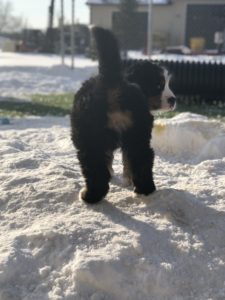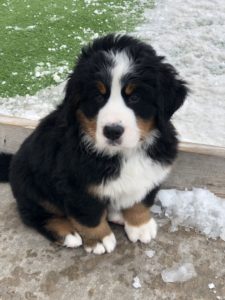Potty Training
 Let’s talk about one of the biggest questions people have with their puppies – potty training! The number of times that puppy class clients have asked me why their 10-week old puppy isn’t potty trained yet, or why the puppy doesn’t “tell” them when they have to go potty is through the roof. It’s one of the most common puppy training questions that a trainer gets, and I think the answer is simple, but clients often think it seems complex. So let me try to break it down as best I can.
Let’s talk about one of the biggest questions people have with their puppies – potty training! The number of times that puppy class clients have asked me why their 10-week old puppy isn’t potty trained yet, or why the puppy doesn’t “tell” them when they have to go potty is through the roof. It’s one of the most common puppy training questions that a trainer gets, and I think the answer is simple, but clients often think it seems complex. So let me try to break it down as best I can.
First of all, your puppy will have accidents. Please be prepared for this eventuality with the proper clean-up supplies. Occasionally, someone will get a unicorn puppy that seems perfectly potty trained from day one. However, this is extremely rare. It doesn’t have to be, though, if you’re properly prepared and if your expectation is that every puppy is different, matures differently, and takes a different amount of time to fully potty train. For example: Lyra took nearly a full year to completely potty train, partly because she had a lot of UTI’s as a puppy and partly because we kept stopping with consistency thinking she was good to go, and then she would have a set-back. A lot of this was our fault. Legend is two and still has the rare potty accident in the house. I would say he’s 95% potty trained, but sometimes excitement or forgetting to go outside because he’s too distracted gets the better of him.
So, let’s talk about my process with Kanyon. I should say from the start that he has been easier to potty train than my other puppies have been, and I recall my first Berner being easier to potty train as well. I don’t know why this is to be honest, but I’m not complaining and I have adapted my potty training process to accommodate his needs. The general process I follow with ALL puppies in my home is as follows:
 My puppies sleep in crates until they can be trusted not to potty in the house. They are also crated or gated whenever we can’t supervise them directly – if I’m showering, for example, and no one else is home, Kanyon goes in a crate.
My puppies sleep in crates until they can be trusted not to potty in the house. They are also crated or gated whenever we can’t supervise them directly – if I’m showering, for example, and no one else is home, Kanyon goes in a crate.
- How Kanyon is progressing with this: he has actually been allowed to sleep out of the crate when I sleep at the daycare at least part of the night. This is primarily because he falls asleep before I go to bed, and if I wake him, he tends to wake up and want to play. So I’ve just been letting him sleep where he lies. He’s a hard sleeper, so when he starts to move around, I get up and let him out. Usually I put him in the crate at that point, but last night I was able to let him stay out – he went right back to sleep. However, he woke me up a second time around 2:30am so I took him out then and put him back in the crate at that point. I have never done this with another puppy previously – Kanyon has just been unexpectedly responsible about being left out at night thus far. At home, he’s kenneled because there’s way more interesting things to get into at home!
- Puppies get FREQUENT potty breaks – they have to go out very often. Far more often than you think. And, not all puppies empty their bladder or colon every time they go, so they may need to go even more frequently. I take Kanyon out within 20 minutes of eating or drinking, he goes out after playing hard, after training for 15 minutes, as soon as he wakes up, and if it’s just been 30-60 minutes of being awake. As he gets older, we will modify this slightly, but it’s better to be consistent than to assume they are good to go and not catch an accident before it happens.
- How Kanyon is progressing with this: Kanyon tends to pee multiple times while outside. He doesn’t fully empty his bladder all at once, so if I take him outside, let him pee, and bring him right back inside, he is more likely to have an accident inside because he hasn’t finished yet. So we stay outside a little longer to make sure he has ample time to finish.
- Many people will be worried that their puppy doesn’t “tell” them when they have to go potty. This is such an unrealistic expectation at a young age – of course they don’t tell you. They are babies. Some adult dogs will never tell you, either. Many puppies just go whenever the urge comes, so you have to make sure you’re taking them out more frequently to increase the likelihood of them choosing to go outside rather than inside. That said, often puppies DO “tell” us, it’s just not in the way that you would think. Most puppies don’t bark/cry/whine/run to the door/jingle the bells if you have them or whatever else you might expect them to do to “tell” you. They couldn’t possibly know what to do to tell you they have to go. Just like human babies don’t say “excuse me Mother, I am going to go potty in my diaper now.”
- How Kanyon is doing with this: Kanyon actually has some pretty obvious signs that he needs to go potty, now that I’ve gotten to know him. He does actually get whiny when he has to potty, but it doesn’t always seem like it’s because he has to potty because he can be whiny at other times as well. However, if he’s getting whiny, the first thing I do is take him out to potty, and that often helps. He also tends to get really sassy if he has to poop. He will get more bitey, or start chewing on things he shouldn’t, or get the zoomies, or just generally express more excitement/energy when he has to go. So if he’s getting sassy, we head outside to potty.
- Lastly, I want to make a general note about my transitions as my puppies get older. None of my adult dogs “tell” me that they have to go potty either (although, if they have loose stool or something they will wake us in the middle of the night typically). Our adult dogs don’t have to tell us, because they have some consistency about when they get to go potty. We don’t stick to a schedule in terms of having specific times of the day when we take them out – my life is far too hectic to stick to such a rigid routine. However, they do have some consistent triggers about when then can rely on being able to go out. We let them outside first thing in the morning when we get up, regardless of what time that is. During the week, it’s between 5 and 5:30am. On the weekends, it might be more like 6 or 6:30 (Lyra likes to wake us because she’s staaaaarving). Then they usually get fed, and then we will let them out again before we leave the house. If we aren’t leaving the house, they’ll go out again sometime in the morning after their food has processed a bit. If we are not home, they know they will always get out to potty after we get home and let them out of their kennels. If we are home, we try to get them out every few hours during the day. Then they go potty at the end of the day when we get home, again after dinner, and once before bedtime. Adult dogs typically don’t need to potty as frequently as puppies and can usually go longer during the day, but I like to make sure they can rely on us to get them out when they need to go. We do not wait for them to “tell” us they need to go.
 So, while every puppy is different and you will need to get to know your individual puppy, most puppies have patterns of behavior that you can start to recognize with regard to their need to go potty.
So, while every puppy is different and you will need to get to know your individual puppy, most puppies have patterns of behavior that you can start to recognize with regard to their need to go potty.
One other common problem that people have is that they will take their puppy out to potty, bring them back in, and the puppy will potty almost immediately on the floor inside, even if they just went outside. This is likely a case of puppy not completely eliminating outside. Because some puppies need more time to do their business than others, some puppies will need to stay outside longer. There are lots of other tips for potty training, especially with regard to specific questions or concerns. For another great resource, check out Patricia McConnell’s very short, inexpensive book, Way to Go! How to Housetrain a Dog of Any Age.